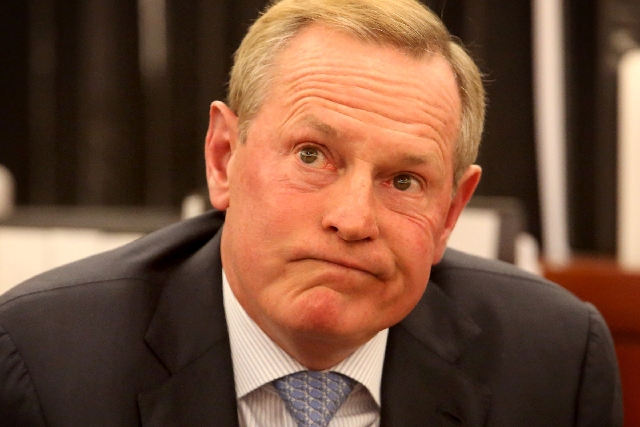Former Sands executive Weidner recounts final days with company
William Weidner’s turn on the witness stand Wednesday quickly skipped to his tumultuous final months as president and chief operating officer of Las Vegas Sands Corp., culminating in his March 2009 departure.
The company’s finances had continued to deteriorate as the recession deepened in 2008, yet he saw no effective response, according to his testimony. After consulting with his own attorney, he submitted an ultimatum to the board of directors in October of that year: Create a “rescue committee” and give him the authority vested in Chairman and CEO Sheldon Adelson, or he would leave the post he had for 14 years.
Weidner said the company had received a “going concern” qualification from its auditors, raising the possibility that it could fail without corrective action.
His recounting of executive suite intrigue came in the Clark County District Court trial in which former Sands consultant Richard Suen is seeking a $328 million fee, saying his help was critical in the company gaining its Macau foothold. The trial has entered its second week and is expected to run until early May.
“I had lost confidence in (Adelson). He had not refinanced” to bolster the balance sheet, said Weidner, 68. “I had lost confidence in him, quite frankly, because he had this trial. And this trial, quite frankly, was injurious to relationships with China.
“It should have never been in a courtroom like this. I lost confidence in his decision making.”
Weidner was referring to Suen’s first trial, in 2008, when a jury awarded him $43.8 million. The verdict was overturned by the Nevada Supreme Court in 2010.
Because of his legal obligations to shareholders, Weidner felt he had to try to right the ship “without Mr. Adelson’s interference,” he said.
But he did credit Adelson and other investors for injecting fresh capital into Sands, helping it to ride out the recession and ultimately rebound.
By March 2009, however, the board decided the arrangement had broken down. At that point, Weidner said, he resigned after the board gave him that option.
“It was disappointing but not unexpected,” he said. “They informed me the relationship wasn’t working. Mr. Adelson was continually upset.”
Subsequent talks about a severance package failed, Weidner said, because Adelson insisted on a clause that he would not disparage the Sands chairman in public.
Adelson, he added, would not sign a reciprocal promise.
After that, Weidner said, Adelson told him he was fired with no compensation even though he had already quit.
In his testimony last week, Adelson said he had ousted Weidner, his top lieutenant from the start of the company, over differences of opinion. He did not go into specifics.
Adelson did not appear in court Wednesday, after sitting in the audience for two days of Suen’s testimony this week, frequently taking notes and conferring with his legal team.
Suen attorney James Pisanelli bypassed Weidner’s dealings with the Hong Kong businessman to try to put his motives in front of the jury.
When asked whether he harbored resentment against Adelson, Weidner replied, “I would say I was not treated well. … I’m disappointed, but life is too short to be angry forever.”
Weidner said he had decided not to sue the company for back compensation. In previous testimony, he estimated the value of the package under discussion at $20 million to $60 million, mostly because of stock options.
Even though the company has substantial funds for attorneys, Weidner felt his finances were strong enough that “it would have been a reasonably fair fight,” he said.
Weidner, still a Las Vegas resident, now owns Global Gaming Asset Management, which partly owns and manages Solaire, a casino that opened last month in Manila Bay in the Philippines. Weidner also owns part of a trading company that exports commodities such as food and lumber to China.
In both his testimony and the replay of a deposition he gave in 2005, Weidner said a contract was never reached with Suen over how much he should be paid for his work in getting Sands into Macau.
Suen, 60, claims he is owed $5 million plus 2 percent of the net profits from Macau for the two decades ending in 2022, which his experts estimate would amount to $328 million.
Weidner said there was never a definition, for example, of how to calculate net profits.
He did credit Suen with providing “valuable services” in helping the company, such as understanding the workings of the Chinese government, even though he did not deliver a gaming license.
Instead of a contractual obligation, Weidner said he thought the company had a “moral obligation” to pay Suen something.
“We ought to figure out some way to reimburse him for his time and efforts,” Weidner said. “I do know Sheldon supported some way to give value to Richard for his time and effort.”
Adelson has refused to pay anything, saying that Suen’s work did not deliver a license as promised.
Instead, Adelson said Sands won entry into Macau because of in-house efforts.
Weidner’s testimony continues today.
Contact reporter Tim O’Reiley at
toreiley@reviewjournal.com or 702-387-5290.
Tweets about "#lvrj from:howardstutz"
!function(d,s,id){var js,fjs=d.getElementsByTagName(s)[0],p=/^http:/.test(d.location)?’http’:’https’;if(!d.getElementById(id)){js=d.createElement(s);js.id=id;js.src=p+"://platform.twitter.com/widgets.js";fjs.parentNode.insertBefore(js,fjs);}}(document,"script","twitter-wjs");

















